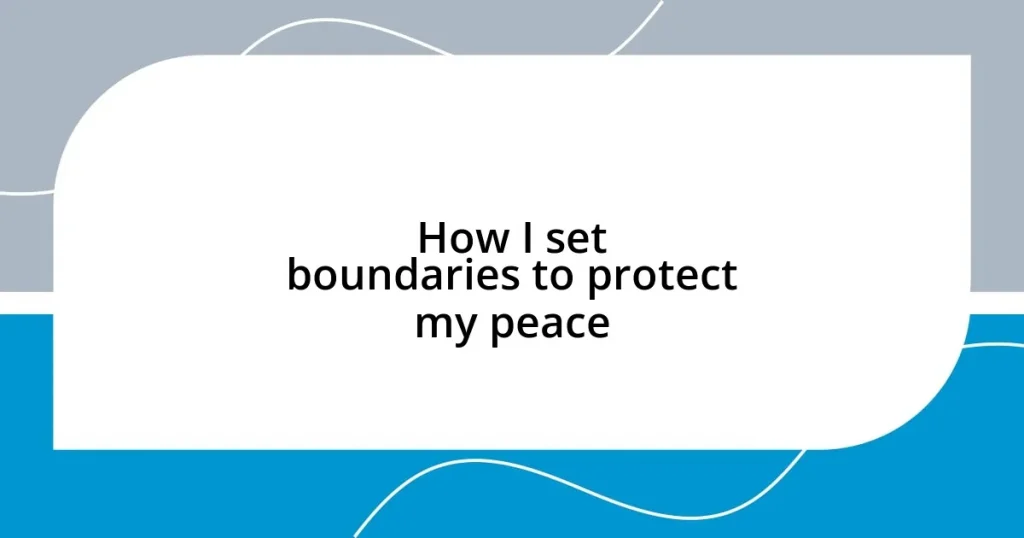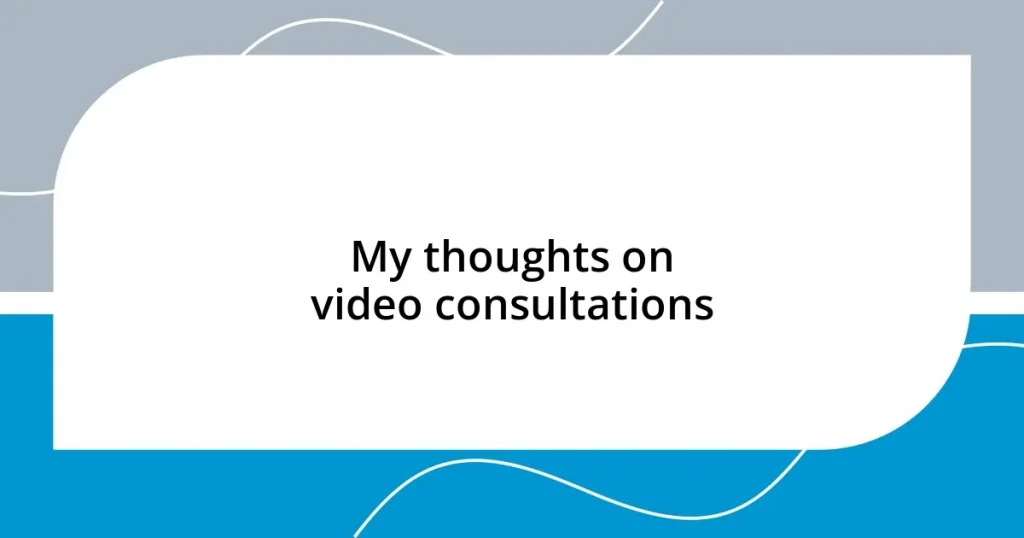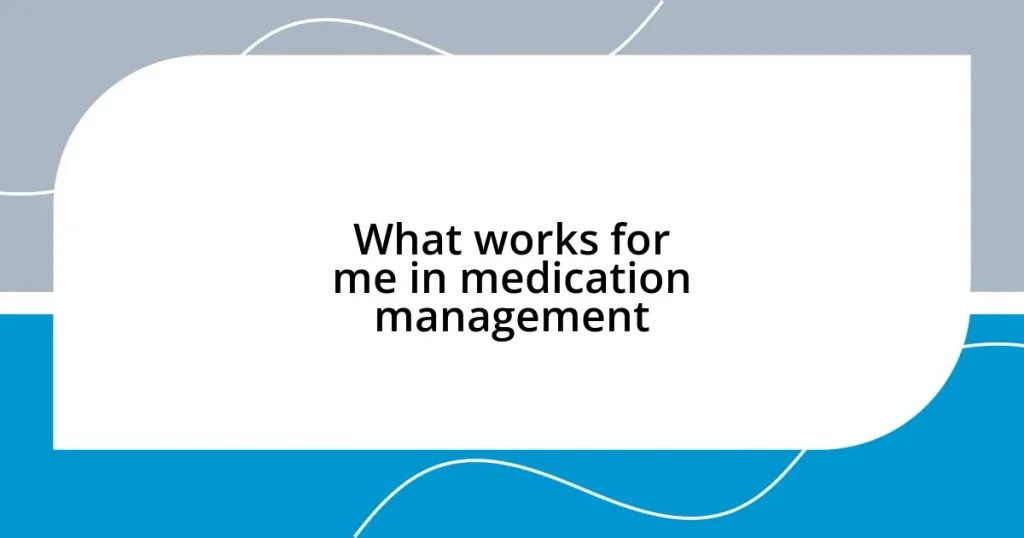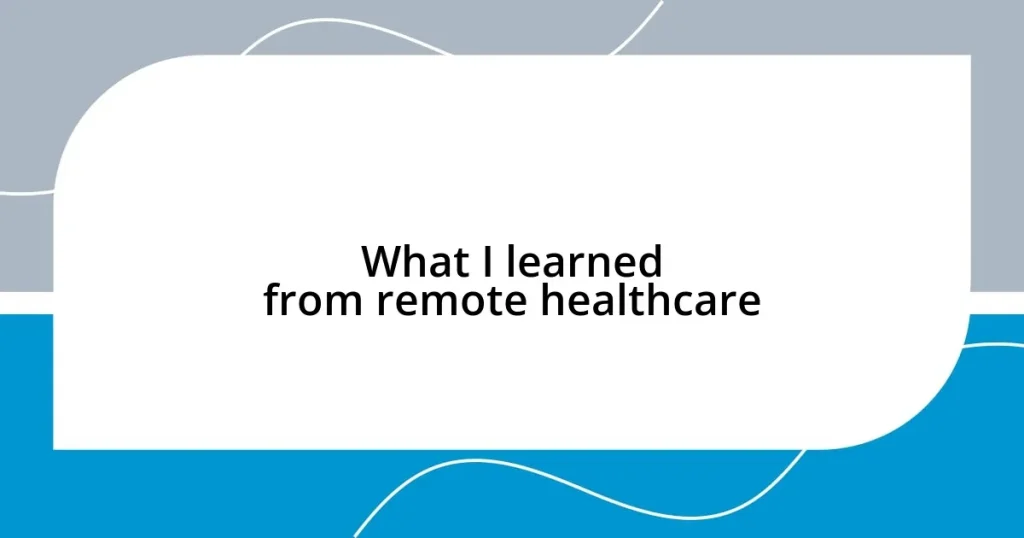Key takeaways:
- Setting and communicating boundaries is essential for mental well-being, allowing for healthier interactions and personal peace.
- Recognizing toxic influences in relationships helps in evaluating their impact on one’s energy and emotional state.
- Regular reflection on boundary effectiveness and willingness to adjust them fosters personal growth and improves relationships.
- Practicing self-compassion while setting boundaries reinforces the importance of prioritizing one’s own needs without guilt.
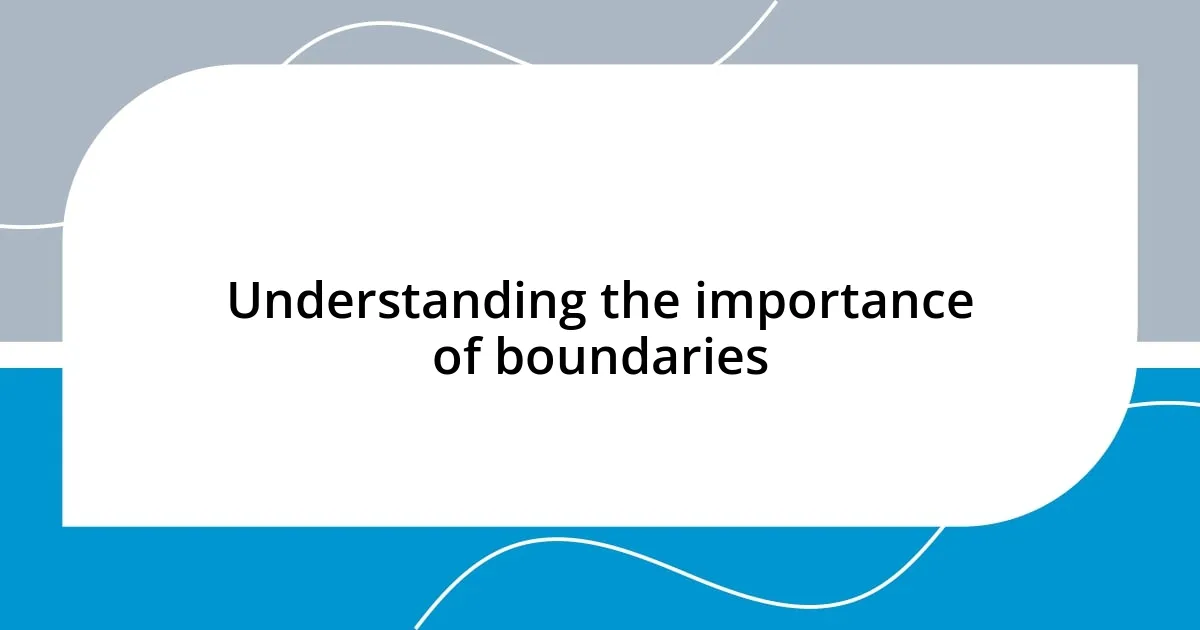
Understanding the importance of boundaries
Setting boundaries is crucial for maintaining my mental well-being. I vividly remember a time when I felt overwhelmed by constant requests for my time. I needed to reflect: why was saying “yes” making me feel so drained? It became clear that without boundaries, I was sacrificing my peace for others’ expectations.
I often think about how boundaries act as emotional shields. For instance, I once had to set limits with a close friend who frequently vented her problems without considering my own emotional state. I felt guilty at first, but I learned that putting my own needs first didn’t make me a bad friend; rather, it allowed me to be present and supportive when it truly mattered.
Have you ever noticed how much more enjoyable conversations can be after establishing clear boundaries? I experienced this firsthand when, after establishing certain limits, my interactions became more positive and fulfilling. It taught me that boundaries are not just about saying “no,” but about saying “yes” to the things that nourish my spirit.
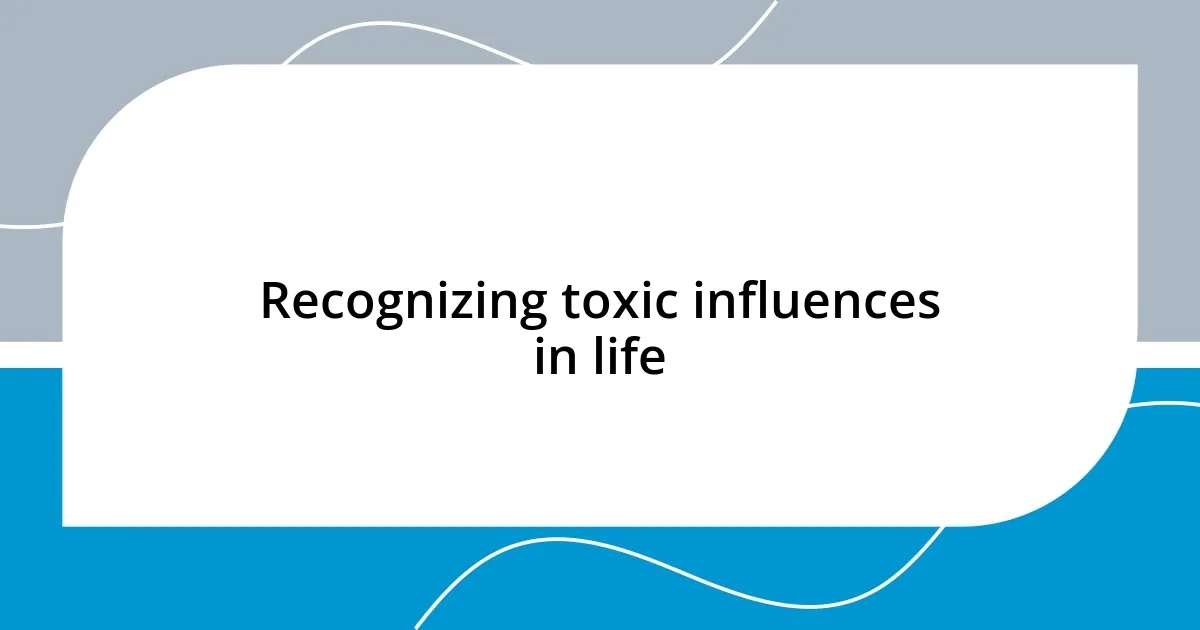
Recognizing toxic influences in life
Recognizing toxic influences in life can be a challenging but necessary endeavor. When I started reflecting on my relationships, I began to notice patterns of negativity that drained my energy. One friend, for instance, would regularly criticize my choices under the guise of “just being honest.” This realization led me to understand that honest feedback shouldn’t come with a side of guilt or shame. I learned the importance of evaluating whether someone’s presence in my life felt empowering or depleting.
It’s fascinating how certain relationships can subtly impact our mental space. I recall a colleague who constantly displayed jealousy over my achievements, often making sarcastic remarks disguised as jokes. At first, I brushed it off, but the negativity began to weigh on me. I realized this toxic influence was not only affecting my mood but also my motivation. I needed to decide whether fostering such a relationship was worth sacrificing my mental peace.
To help clarify what constitutes a toxic influence, I often compare different types of relationships. It has been enlightening to categorize them based on how they affect my well-being. Understanding this helped me recognize who I should engage with and who I needed to distance myself from.
| Type of Influence | Impact on Well-Being |
|---|---|
| Supportive Friend | Nurtures positivity and encouragement |
| Toxic Friend | Drains energy and fosters self-doubt |
| Encouraging Colleague | Promotes growth and collaboration |
| Jealous Colleague | Creates an atmosphere of competition and negativity |
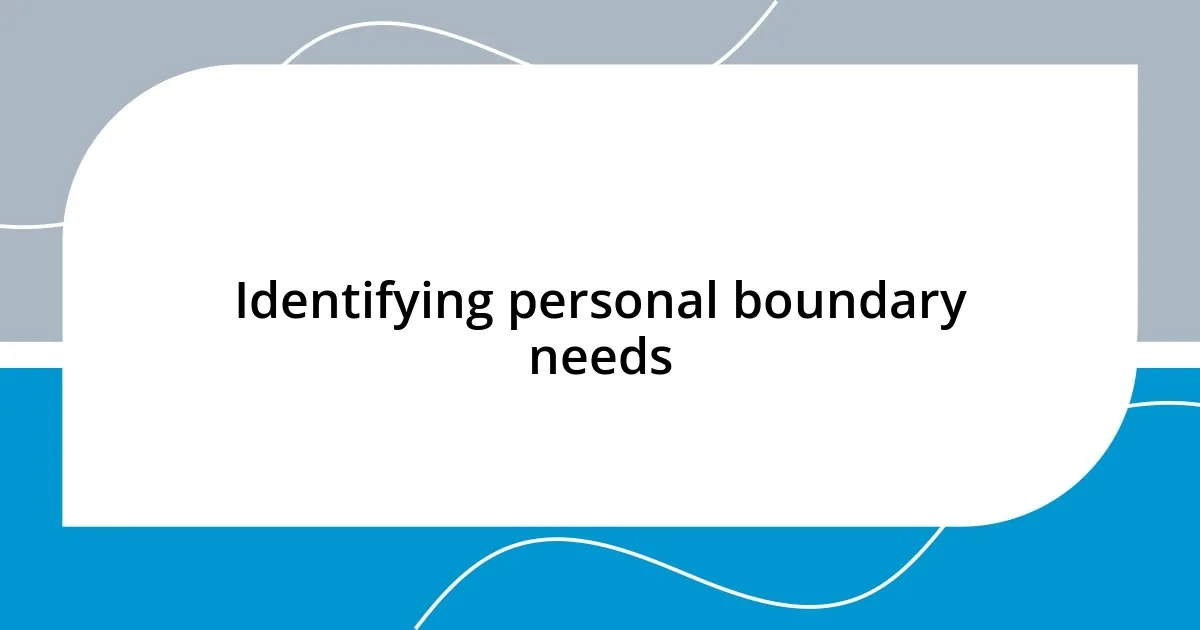
Identifying personal boundary needs
Identifying my personal boundaries has been a transformative experience. It often starts with introspection—asking myself what situations leave me feeling drained or frustrated. One day, after a particularly exhausting group project, I realized that I was always the one picking up the slack for others. It was an eye-opener, prompting me to define what I was comfortable with regarding teamwork and my time.
To help clarify my needs, I began journaling about my feelings after various interactions. This practice revealed common themes that highlighted my boundary requirements. Here are some insights that helped me discern my personal boundary needs:
- Time Management: I recognized that I need scheduled downtime to recharge. Constant social obligations made me feel overwhelmed.
- Emotional Energy: Certain conversations left me feeling heavy. I learned to limit discussions around heavy topics that drained my emotional resources.
- Respect for Personal Space: I found that I value time alone for reflection and creativity, so I began to assert this need more clearly to those around me.
- Expectations of Support: I realized how much I wanted reciprocal support in friendships. It was essential to communicate that I also needed to be heard and validated, rather than always being the caretaker.
As I learned to articulate these boundary needs, I noticed that my interactions became healthier. A friend, who once frequently barged into my personal time without asking, now checks in before scheduling hangouts. This shift has strengthened our relationship and allowed me to feel more in control of my own space.
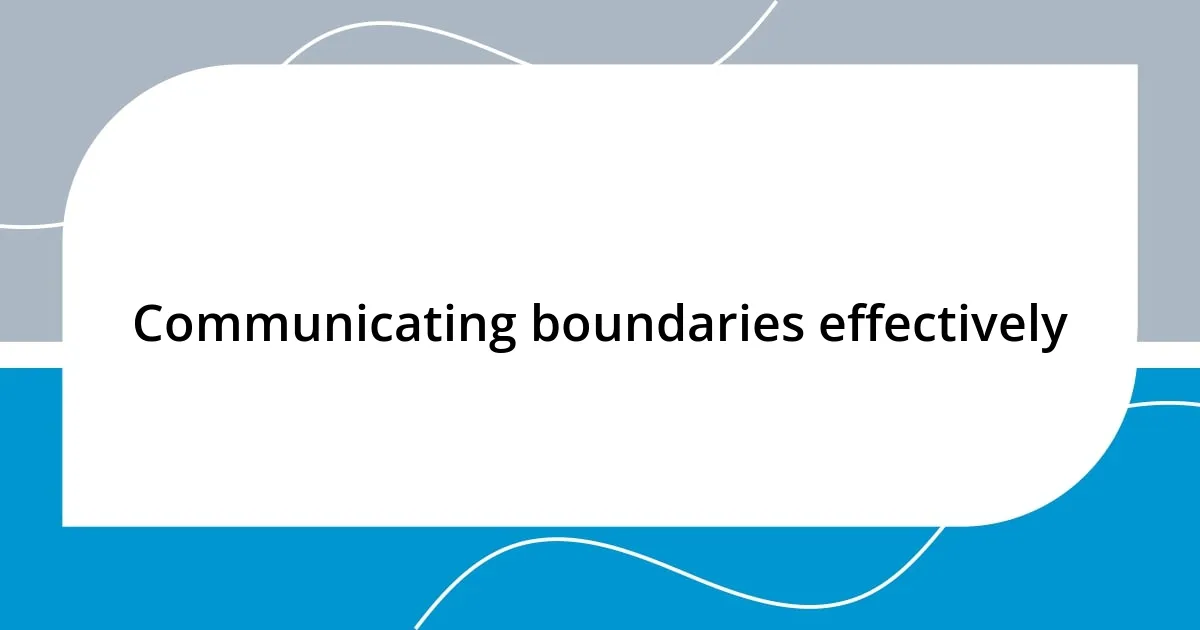
Communicating boundaries effectively
Communicating boundaries effectively is about clarity and compassion. I remember a moment when I needed to tell a close friend I couldn’t attend her constant last-minute plans anymore. Instead of framing it as a rejection, I approached it with an honest expression of my feelings, saying, “I love spending time with you, but I feel overwhelmed when plans come up suddenly.” This openness helped her understand my perspective without feeling blamed.
When saying no, I find it essential to explain my reasoning without going into excessive detail. It’s like giving someone a glimpse into my thought process. For instance, I once explained to a colleague that I couldn’t take on more responsibilities at work because I was prioritizing my mental health. I explained that focusing on my current tasks will help me perform better. By sharing the “why,” I felt empowered, and it also encouraged a heartfelt conversation about work-life balance.
Tone plays a crucial role in how our boundaries are received. I’ve learned that the way I express my needs matters just as much as the message itself. The clear and respectful tone I adopt can transform potentially uncomfortable conversations into more meaningful exchanges. For instance, when a family member consistently interrupted my hobbies, I gently told her that my time for those interests was significant for my well-being. I asked, “Can we find a balance where I still have my creative time, and we can enjoy our family time together?” These discussions not only assert my boundaries but also foster understanding and support.
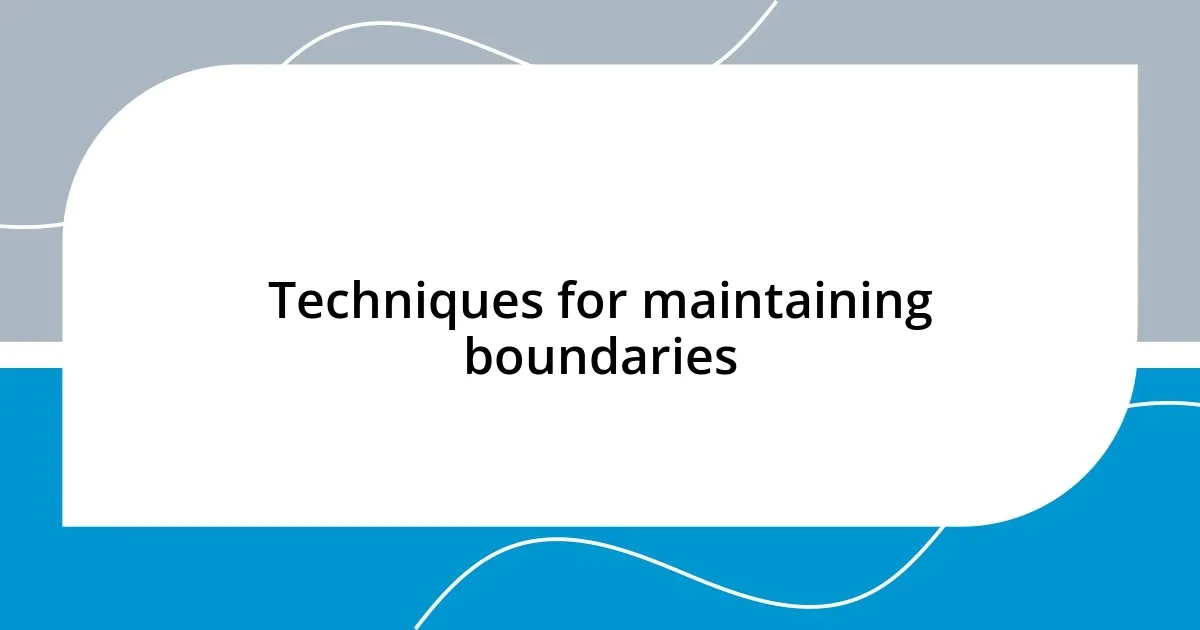
Techniques for maintaining boundaries
Maintaining boundaries requires consistent and mindful techniques. One effective approach I’ve embraced is the use of visual reminders. I created a small poster with my core boundary principles, which I placed in my workspace. Every time I glance at it, I’m reminded of my commitments to myself. It sparks a sense of accountability that helps keep me aligned with my intentions. Have you ever considered using visual cues to reinforce your limits?
Regular check-ins with trusted friends also play a vital role in maintaining my boundaries. These conversations help me reflect on my experiences and gather feedback on how effectively I’m communicating my needs. For instance, I once confided in a friend about feeling overwhelmed by family obligations. During our chat, she encouraged me to set specific times for family visits, making it easier for me to enjoy those interactions without feeling suffocated. This approach not only keeps my boundaries at the forefront but also allows for personal growth through support.
I’ve found that practicing self-compassion is a cornerstone technique for preserving my boundaries. When I face resistance or guilt for asserting them, I remind myself that it’s okay to prioritize my peace. I often repeat a mantra: “My needs matter.” This mantra has transformed my mindset and allowed me to approach boundary-setting as an act of self-care, not selfishness. After all, how can we truly support others if we’re running on empty?
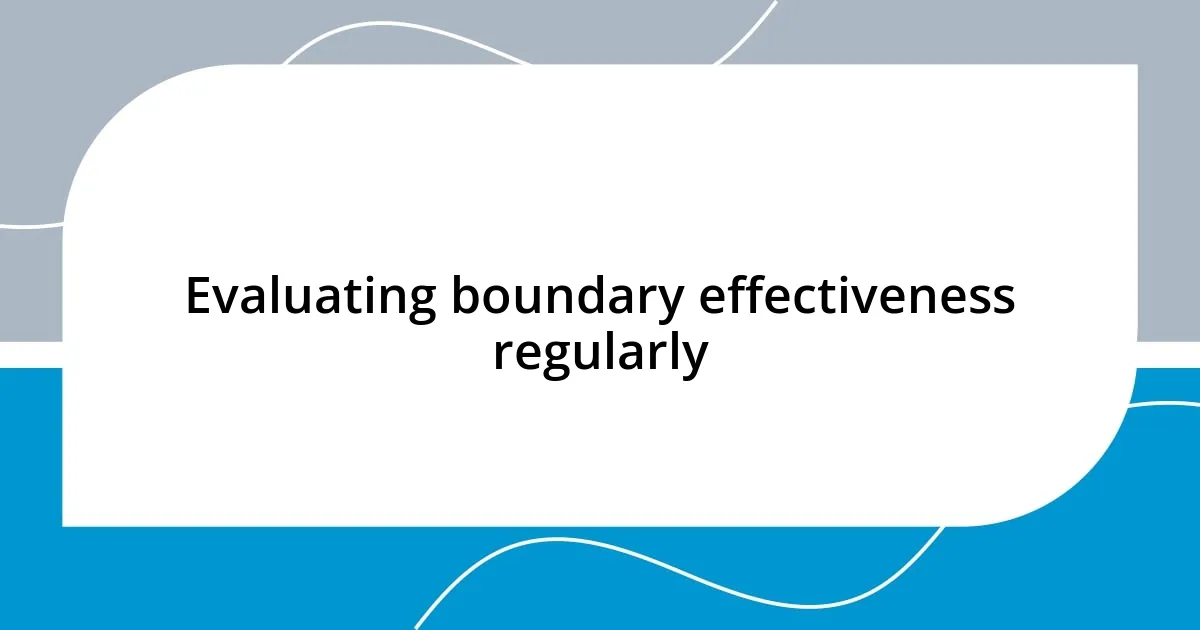
Evaluating boundary effectiveness regularly
Evaluating the effectiveness of my boundaries has become a practice I value immensely. I often find myself reflecting on whether my established limits genuinely protect my peace or if they need some adjustment. For instance, after a particularly exhausting week, I sat down with a journal and assessed how well I had maintained my boundaries. It was enlightening to realize that certain social commitments felt overwhelming, prompting me to reconsider those arrangements.
Regularly checking in with myself is essential. I’ve developed a habit of asking questions like, “Are these boundaries still serving me?” or “Do I feel lighter or heavier after social interactions?” There was a time when I would say yes to every invitation, which left me completely drained. After one exhausting event, I recognized that my boundaries weren’t protective but rather, they were being crossed. Since then, I’ve made it a point to re-evaluate my commitments and analyze how I truly feel about each situation.
Feedback from others plays a pivotal role in this evaluation process as well. I’ve learned to engage friends in conversations about how my boundaries affect them, which opens up a whole new dialogue. Last month, I shared with a close friend that I needed to limit our weekend hangouts due to personal responsibilities. His honest response made me realize that he appreciated my honesty and was more than willing to adjust accordingly. This mutual understanding not only strengthened our friendship but also reminded me that healthy boundaries can lead to deeper connections. How has evaluating your boundaries shaped your relationships?
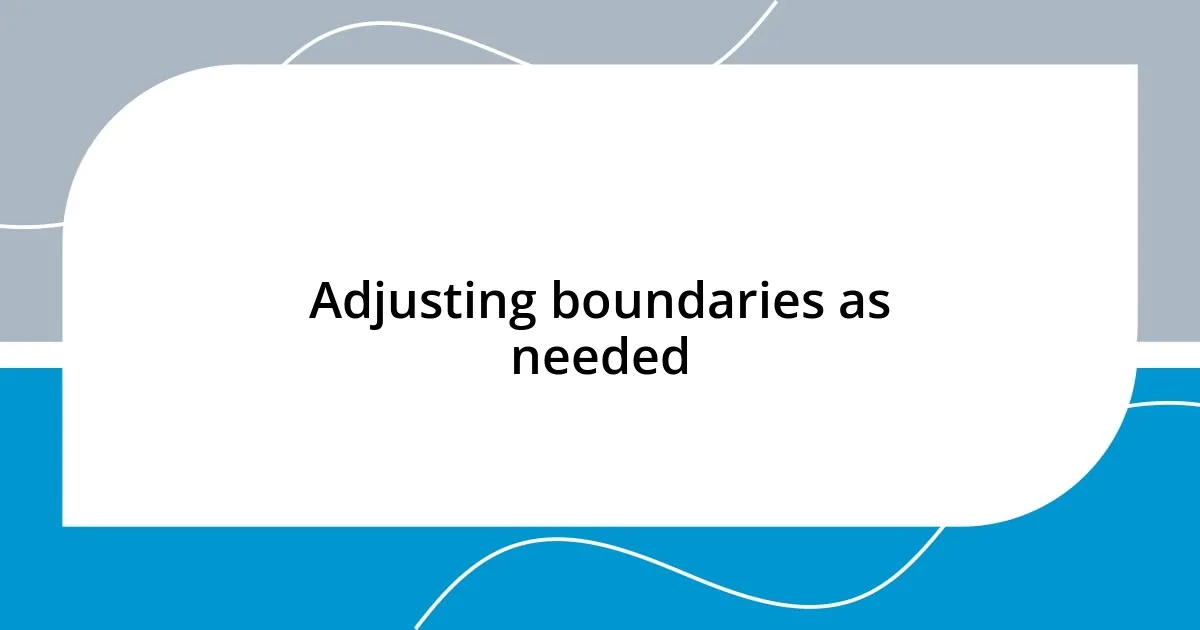
Adjusting boundaries as needed
When it comes to boundaries, I’ve learned that flexibility is crucial. There have been moments when I felt the need to tighten my boundaries after overwhelming experiences. For example, after taking on more responsibilities at work, I realized my interactions with a friend were becoming too demanding. Instead of feeling guilty about reducing the time we spent together, I communicated my need for a break, and to my surprise, she completely understood. Have you ever hesitated to adjust a boundary, thinking it might hurt someone, only to find that honesty deepens the relationship instead?
Then there are those times when I’ve recognized the need to loosen my boundaries as well. There was a phase when I was overly strict with my downtime, stating “no” to everything. I remember a friend inviting me to an event that I initially turned down, thinking I needed to recharge. Yet, after considering the joy it could bring, I changed my mind and attended. It reminded me that being too rigid can sometimes limit the joy and spontaneity in life. Why do we often feel the need to stick with our original decisions, even when our feelings shift?
Ultimately, regularly assessing and adjusting my boundaries is a sign of growth. It’s a continual process that requires self-reflection and compassion. I often tell myself, “It’s okay to change your mind.” This mindset allows me to navigate my relationships with discernment, ensuring they remain healthy and fulfilling. Learning to adjust my boundaries as needed has helped me reclaim my peace without sacrificing meaningful connections. Do you find that adapting your boundaries leads to more rewarding interactions in your own life?











